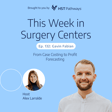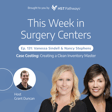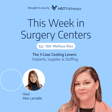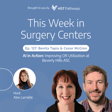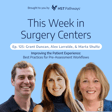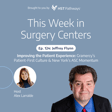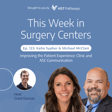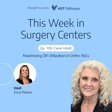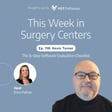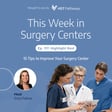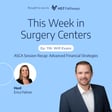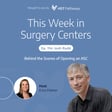Introduction to the Podcast
00:00:01
Speaker
Welcome to This Week in Surgery Centers. If you're in the ASC industry, then you're in the right place. Every week, we'll start the episode off by sharing an interesting conversation we had with our featured guest, and then we'll close the episode by recapping the latest news impacting surgery centers. We're excited to share with you what we have, so let's get started and see what the industry's been up to.
00:00:27
Speaker
Hi, everyone. Here's what you can expect on today's episode. When most people think about clinical operations, they typically focus on the few hours that the patient is at your ASC for their procedure.
Pre-Surgery Clinical Operations
00:00:41
Speaker
Katie Seifer is a senior consultant at Left Coast Healthcare Advisors, and she's here today to talk about how clinical operations actually begin long before the patient's date of service, starting with patient education and ending with post-surgical follow-up.
00:00:56
Speaker
ASCs who have the best clinical operations and therefore high patient satisfaction and overall surgery center performance tend to take a holistic approach and focus on the whole healthcare journey. So Katie will share tips and ideas to make sure you're zooming out and improving clinical operations from start to finish.
Industry News Recap
00:01:17
Speaker
In our news recap, we'll cover CMS's 2024 final payment rule, America's best ASCs, how to track clinical metrics for total joint success, and of course, end the new segment with a positive story about a heart doctor who saved a man's leg and life on the streets of New York City. Hope everyone enjoys the episode and here's what's going on this week in Surgery Centers.
Katie Seifer's Background
00:01:46
Speaker
Hi Katie, welcome to the podcast. Hi Erica. Thanks so much for having me. Yeah. Can you share a little bit about yourself and about Left Coast Healthcare Advisors with our listeners, please? Yes, of course. So I'm a dietician that went back and got my MBA. And the reason I did that was because I wanted to align clinical practice and the business practice. And my experience has been in development, sales,
00:02:14
Speaker
patient care through co-starting two eating disorder clinics. And then I was managing a health screening, medical device sales, as well as healthcare operations. And currently I am the senior consultant at Left Coast Healthcare Advisors. And we're a consultant firm that our mission is to bring your ambulatory strategy vision from concept to reality. And we do that through working with you if you want to expand into a new location.
00:02:43
Speaker
or you're evaluating and want to improve your repair contracting, or even streamlining your clinical operations. And throughout my career, my focus has always been on improving the mental and physical wellbeing of those that I work with and work for so that they can operate and function at the top of their game.
00:03:02
Speaker
Love it. Yes. And we just got done with a nine part de novo series. And we did have a few of your colleagues on in that series to talk through some of the regulatory stuff and expansion. And so I'm super happy to have you on today, especially because.
00:03:18
Speaker
We have not talked about clinical operations in depth yet, and I think it's incredibly important just the impact clinical operations can have on all ASC stakeholders. And I think we're in alignment here that when we say stakeholders, we mean everyone. So from the office scheduler to the patients and even their families to physician staff, everyone.
00:03:43
Speaker
First, to kick us off, how do you define and characterize clinical operations within the context of a surgery center?
Defining Clinical Operations
00:03:50
Speaker
I'm really glad we're starting with this question because I think it does lay the foundation for what we're going to talk about today. And we often think clinical operations as when the patient enters the door of the ASC until they leave.
00:04:03
Speaker
But so much happens with that patient before they even get into the walls of that ASC. And so for the purpose of today, I want to define clinical operations as the entire journey. So starting with when that patient makes a decision to have surgery all the way through until they leave after their surgery is done and want to view it as one continuous road. Love it.
00:04:28
Speaker
So let's start with one of the most important stakeholders that you just mentioned, the patient. Are there specific practices that prioritize the patient's experience?
Enhancing Patient Experience
00:04:39
Speaker
Yeah, I think when it comes down to it, we're all here for the patient, but it's really easy to get caught up in what my individual role is versus looking at how it fits in to that greater patient experience, that greater patient journey.
00:04:56
Speaker
And so taking a step back and looking at it from the patient perspective can help identify what opportunities you may want to adjust to create that seamless road. So good questions to ask, is the patient receiving pre-surgery education? Who's giving it? Is the surgeon's office giving it? Are you giving it? If multiple people are giving it, if no one's giving it, that can really impact how that patient is getting ready and prepared for that day of surgery.
00:05:25
Speaker
You want to align on those efforts so that it really ideally, the patient is getting information in one, I'll call it a packet, that doesn't have duplicated information and also doesn't contradict itself. And then another piece that can really help the patient is there's so many questions that they have a list of questions or frequently asked questions and who do they contact? We want to save time here. If they're calling the surgeon's office for a question that could be answered by the surgery center,
00:05:54
Speaker
Give that patient the list of who to reach out to for the questions that they have. And then another hot topic I'll say right now that we hear often is the billing. And it can get so confusing for a patient because they can get billed from numerous different surgeons, doctors, locations. And so give them a list. Hey, this is what you should expect or who you should expect to get a bill from. And I think at the end of the day, taking the time to implement a joint
00:06:23
Speaker
patient readiness plan that clearly lays out the rules and responsibility. Help the patient feels like everybody is on the same page and working together to support them.
00:06:34
Speaker
Yeah, I think that's all really good advice. I was just talking to one of our clients and I had asked them because I noticed their website was down and they said that it was causing so much patient confusion because the information they had on their site was so different than what the doctor had shared with them. That they had other issues with the site, but they're like, let's just blow it up and start over because it was more confusing for the patients trying to do their own research without having to contact somebody.
00:07:04
Speaker
So I thought that was frustrating. I think more than we think we would. Yeah, absolutely. Yeah.
00:07:13
Speaker
I know in the transparency and the billing side of it, we could talk about for hours as well. So I think that's all really good advice. If we're talking about stakeholders, we can't forget the physician's office and the scheduler. And I'm so glad you had brought this up because I often forget about the scheduler who is such a key piece of making all of this run smoothly. So how can workflows be improved for them and why is that important?
Optimizing Workflow Efficiency
00:07:38
Speaker
Yeah, and I'll say first as a clinician, anything that helped minimize duplication on my day-to-day actions was greatly appreciated and really helpful. And so I think when we look at the physician's office and the scheduler, it comes down to the surgeon wants to perform surgery. They want to take their patients where it's consistent. They know the staff is knowledgeable. And so finding ways to work with the surgeon's office and the schedulers
00:08:07
Speaker
can be really helpful in making that easy for everybody. And so having regular scheduled meetings, which most people already do with the Surger Center and their surgeon's office, but take the time
00:08:20
Speaker
to talk about what's working well and then discover what's challenging from the scheduler's perspective, from the surgeon's perspective. And that gives you those starting points to say, hey, we might need to adjust or tailor or create or stop a workflow that's already in process. But instead of you just doing it and thinking this will make a difference, you're really getting feedback from the people that are using it. I like it. I also feel it's important
00:08:49
Speaker
to remember that work with those are not meant to make life harder. Now, there's a learning curve. Often it may be a little harder in the beginning, but the goal is to either simplify a task, to reduce duplication, and to improve an outcome.
00:09:05
Speaker
Yeah. All of that makes sense. And I would imagine being on the clinician side. It's just so nice when you have that seamless workflow and there's a surgeon who wants to have a surgery somewhere and what's going to be nice and simple. And it's like, Oh yes, I get to schedule with them first. The one that's maybe a little more complicated. And that takes time and it takes intentionality and getting those two groups of people together to make a plan and evaluate and adjust if needed.
00:09:34
Speaker
Yeah, it might've been maybe Michael or one of your coworkers who had said to like, don't forget them around the holidays. And if you're sending thank you baskets or whoever, don't forget to schedule her at the physician's office as well. So along with the rest of the industry, we've been talking more and more lately about anesthesia.
00:09:54
Speaker
and really trying to bring your anesthesia group into the fold more and truly think of them as a partner, not a third, not a third party, but someone that is a stakeholder. So what advice do you have for streamlining clinical operations to strengthen that relationship?
Communication Between Surgeons and Anesthesiologists
00:10:12
Speaker
I love that we're talking about this because it does fall right in line with that continuous path. And anesthesia plays such a huge role in
00:10:23
Speaker
how the actual, let's say the time of the surgery, how the patient is set up and that whole experience. And so the people that do it the best have really great, I'll say alignment and communication between the surgeon and the anesthesiologist. And what I would recommend is first align on patient criteria. Have the surgeon and the anesthesia team work together. Who is an appropriate candidate patient for having their surgery at the surgery center?
00:10:52
Speaker
And this especially holds true if anesthesia doesn't see them until the day of surgery, because the last thing that anybody wants is a canceled surgery because the patient isn't fit that the anesthesiologist says, Hey, they're not fit for surgery. And so that throws everybody into a loop, into chaos and also increases frustration. So really working together to align and say, these are the right types of patients with these criteria that we all feel comfortable with.
00:11:18
Speaker
And then the pre-op screening, who's going to be doing the pre-op screening? Is the surgeon going to do it? Is anesthesia? Making sure that you're aligned on, number one, who's doing it and that the patient clearly knows where they're going to go for that pre-op screening and that the questions that are going to be screened for, everybody agrees upon.
00:11:37
Speaker
And that if anything arises in that screening, there's a communication channel so that everybody knows. Because if the surgeon finds something and an anesthesia doesn't know, then that causes frustration and vice versa. So I would say to summarize, create communication opportunities that build trust and rapport with the anesthesiologist, the team, and the surgeons will go a long way in building that relationship and creating seamless experiences for everybody.
00:12:07
Speaker
Yeah. And I think the, having that criteria set up front will take away any feelings of, Oh, this anesthesiologist would have done it. This one wouldn't have, or vice versa. And it's like, there's no room for gray area. Here's a agreed upon criteria. It's very, try to make it black and white. Especially in surgery centers that operate at such a fast cadence. The goal of surgery is, okay, we're a well-oiled machine. If you don't have that agreed upon criteria, it really can slow down.
00:12:37
Speaker
your process. Yeah. Yeah. And again, it's like, I know people are really struggling with staffing anesthesiologists and getting the groups in, getting everybody there. So again, just strengthening that relationship and having that trust in one another, it's really the only option.
00:12:56
Speaker
Okay. So you're putting in all of this work to improve your clinical workflows, but obviously we want to be able to track and measure all of the efforts. So how can ASCs evaluate if their efforts are paying off?
Tracking Improvements in ASCs
00:13:11
Speaker
I think everybody knows that tracking and measuring is really important. In every type of business, especially healthcare, we want to say, hey, is it working?
00:13:22
Speaker
but it is hard, it's time consuming, and it's one of those, I'll say, tasks that can easily get stuck to the bottom of the barrel of work that needs to happen.
00:13:33
Speaker
And so when you're choosing something to measure, you're choosing to implement something new, my experience is it's best to start small and be really intentional about what you're trying to measure. So start with something you want to improve on. You don't want to track if you're tracking one thing, you don't want to all of a sudden track 20 things.
00:13:52
Speaker
Hey, what are we working to improve? Is it patient satisfaction? Is it staff satisfaction? Is it decreasing same day cancellations? And if you don't know where to start, there are benchmarks, and I know we'll get to that in just a minute, where that has regional and national benchmarks to measure. VASCA is a great resources for that. So you can always start there, but just choose one or two metrics to start with.
00:14:18
Speaker
And the key is to make sure you have the ability to measure it. And what I have found as a clinician, I'm like, I want to measure this. And you go to the data person and said, we don't have that information readily available. You're going to have to manually do that, which takes a lot of time. And so when you decide, hey, we want to measure and track this, make sure that you have the ability to measure and track it, else you're going to spend a lot of time trying to pull all the pieces together.
00:14:44
Speaker
to evaluate that. You want to align across all of the people that we've been talking about. If your surgeon's office is measuring something, the Surgeon's Center doesn't need to also measure it. Work with them to say, hey, can I get those results and add that in? Don't duplicate your efforts. And I think the big, I would say when you're doing, deciding to measure, celebrate your wins and your successes with your whole team. Everybody's working so hard to try something new and to evaluate something new.
00:15:11
Speaker
Take the time to celebrate and to say, hey, we're doing a great job. Look at how we've improved on X, Y, and Z. But keeping with the journey theme, avoid looking at metrics as a snapshot, like a point in time. Because metrics, we want to look at the trend. We want to say, hey, what was happening before we implemented this, we're measuring it, and how are we doing after? But it is also a journey. And so you want to avoid getting caught if this is how we're doing today. But what is the trends over time?
00:15:39
Speaker
And then it does sound elementary, but choosing metrics that we've already said this is choosing metrics that are impactful and measurable can be hard. So you finding that data person or that data guru in your office that can really help guide and say, we have access to X, Y, and Z. It's an easy poll is a great person to involve in this conversation.
00:16:01
Speaker
to make sure that it will make your life easier and that you can continue to track and measure without spending hours doing it.
00:16:11
Speaker
Yeah, all great advice. And I'm going to sound like a broken record here, but we're all like without software. I don't know how anybody could track and measure these things, especially trending over time. It's one thing to do it for a quick QAPI study. But if you're really looking to improve in these areas, go to the power user of who with your software or your data team or whatever resources you have and say, here's what we want to track. How come you get me there?
00:16:38
Speaker
And one other point that I would add is once you've said, Hey, I've reached my target. We're highly compliant. We're doing great. Figure out how to continue to keep that high level of success going while you start to add in new metrics, but don't just bombard yourself with everything. Reach your goals, figure out how to maintain it, and then continue to add on from there.
00:17:05
Speaker
Yeah, and I think starting with one or two is great advice because it can get overwhelming. You mentioned benchmarks, but are there specific ones that you would recommend ASCs can start with or should be using to assess and improve the quality of their clinical operations?
Recommended Benchmarks for ASCs
00:17:21
Speaker
There are definitely, I'll say benchmark standards that are out there. So patient falls in the ASC, medication errors, consent errors.
00:17:31
Speaker
prolonged anesthesia, recovery time. There's also ones that would be a little bit harder to measure, like ED visits, one day post discharge. When it comes to the benchmarks,
00:17:45
Speaker
What do you, what's your goal? What are you trying to do? And so looking at what certifications do you have or what certifications are you looking to have? And then what metrics are they going to require for you to get that certification is a really good place to start. Cause it can get overwhelming when you go to them and say, Hey, we're going to measure everything. But really start with what are we trying to improve on and what kind of certifications do we want and then build it out from there.
00:18:14
Speaker
The other important piece to keep in mind is EHRs, especially if you're looking to measure or capture data for care that's provided outside of your walls. For example, the ED visits after a surgery.
00:18:32
Speaker
that's harder information to get. So if that is something that's important for you to benchmark, especially in talking to your surgeons, or if you're marketing or trying to get a certification, prioritize figuring out how to incorporate or get interconnected sources so that you can get that data.
00:18:49
Speaker
Yeah, the more data sources, the better. It can just give you that bigger picture too and not just be siloed to the data points that your ASC collects. We've talked about tech a little bit here or there, but are there any current or emerging technologies that you believe will have an impact on clinical operations?
Assessing New Technology for ASCs
00:19:11
Speaker
So I'm gonna answer this question just a little bit different, because technology is a huge buzzword. And there are so many emerging tools that promise to simplify your life, make it easier, make it fast, or maybe just even make you a little cooler. But what I would say on the technology front is that work on creating a framework to evaluate emerging technology in the market.
00:19:38
Speaker
So you want to consider what problem are we trying to solve with this technology? How's it going to make my day-to-day easier? Who is it going to impact and have that person involved in the evaluation process? Because they're the ones that would impact the most. What's it going to do to your bottom line? And is it going to reduce duplication and decrease variability? Because technology is forever changing. If I was to suggest something,
00:20:06
Speaker
today or tomorrow in six months, that could be obsolete or something new could be coming. And so I think it's more, I would recommend to focus more on having the framework with the ASR surgery center and your surgeon's office. So as new technology emerges, you have the ability to use that framework to help you make a smart choice.
00:20:28
Speaker
I think that's great advice and kind of goes back to that idea of having that black and white decision making skills where, you know, to your point, one of your surgeons goes to a conference and sees something shiny and comes back and wants it. And it's like, no, we went through the process and here's where we landed on the other side. I think that's really great advice. So the only thing I would add to it is peer review or talk to your peers and see if you are
00:20:54
Speaker
evaluating technology, talk to other people, either locally, regionally, through your associate state associations and see if they've used it too. Because to your point there, I was just at the New York state show and there's so many new vendors there and I'm trying to walk around like, what do you do? Trying to learn myself. So it can certainly be a lot.
00:21:14
Speaker
All right, last question for you, Katie.
Staff Experience as Patients
00:21:17
Speaker
We do this every week with our guests. What is one thing our listeners can do this week to improve their surgery centers? I knew this question was coming, so I did think a little bit about it. What I would say is walk in the shoes of your patients. I'm going to tie this all the way back to how do we really work towards creating a positive patient experience? Have a non-clinical staff member
00:21:42
Speaker
start at the parking lot and go through the intake, the journey that the patient takes, talk to the people that the patient talks to, sit where they sit, go to the OR rooms and really pretend that they're a patient. And what you may find is there are some simple changes that could be adjusted that are cost-free that could make a huge impact for that patient experience.
00:22:08
Speaker
And I'm going to give you an example. It's probably the educator and dietitian in me. My husband was in the emergency room for kidney stone and I was sitting in the room with him and I looked at the light boom above where he was sitting. It was covered in dust. Like it's gross. And doctors come in, nurses come in, staff, administrator, but they don't see it where the caregiver sits. They're never sitting at the chair looking up. And so as simple as letting your maintenance staff know, Hey, clean the top of the
00:22:35
Speaker
those lights could be the difference between a negative social media post and a positive social media post. And so I would say take the time to walk through, see what the patient sees, and you may be surprised that the simple changes could make a huge impact. That is awesome advice, Katie. Thank you, and thanks so much for coming on. I learned a lot. I know our listeners will as well, so we appreciate it. Thank you.
00:23:02
Speaker
As always, it has been a busy week in healthcare, so let's jump right in.
CMS Updates and ASC Changes
00:23:06
Speaker
On Thursday, November 2nd, CMS released its 2024 Final Payment Rule for ASCs and HOPDs. Now, it's not super common that when the Final Payment Rule is released, you hear cries of victory from the ASC industry.
00:23:22
Speaker
But 2024 is certainly one of those years. So ASCA, as always, has done a wonderful job of summarizing what's in the 1,672 page document. So here are a few of the most exciting highlights to know.
00:23:38
Speaker
First, CMS will continue to align the ASC update factor with the one used to update HOPD payments, extending the five-year interim period and additional two calendar years through 2025.
00:23:53
Speaker
And due to the extension of this policy, this means an effective update of 3.1% for ASCs will take place. And this number is a combination of a 3.3% inflation update based on the hospital market basket, which is key, and then a productivity reduction of 0.2 percentage points mandated by the Affordable Care Act.
00:24:17
Speaker
So it's important to note that this is actually an increase of 0.3% from the proposed rule, which is super exciting to see. It doesn't usually go this direction. And as usual, just keep in mind that this is an average and updates might vary significantly by code and specialty.
00:24:36
Speaker
Next up is the covered procedures list. So CMS finalized the addition of 37 surgical procedures to the ASC CPL, including 26 dental codes and 11 surgical codes.
00:24:51
Speaker
which is pretty amazing considering they only had one in the proposed rule. Of course, the one that everyone is most excited about is the addition of total shoulder. In HSC's latest state of the industry report, we had shared that the average ortho case is bringing in $5,449 in revenue per case. So the addition of total shoulder to the CPL has a ton of potential to help ASCs financially thrive.
00:25:20
Speaker
So as always, we will link to the final payment rule and ask a summary so that you can learn more. And a huge thank you to ask the state ASC associations in all ASC industry stakeholders and members who relentlessly advocated on behalf of the industry these past few months to help shape the final rule into what it is today.
Newsweek's Best ASCs List
00:25:42
Speaker
And in more exciting news for the industry, Newsweek released their annual Best Ambulatory Surgery Centers in America list for 2024. Newsweek had shared that they based their rankings on two things, recommendations for medical professionals and a thorough analysis of the facility's performance data. Now, I couldn't find anywhere that elaborated on the data piece of it, so I'm not sure where they're pulling that information from.
00:26:11
Speaker
Take that with a grain of salt, but the list recognizes 550 facilities from the 25 states with the most facilities based on Medicare data. And for the remaining states, they grouped facilities into four regions, Northeast, Midwest, West, and South. So based off of scores alone, the top five facilities in the country are Cedars-Sinai 90210 Surgery Medical Center in California,
00:26:40
Speaker
UCLA Health's Westwood Ambulatory Surgery Center in California, Duke Health's Davis Ambulatory Surgical Center in North Carolina, Coral Gables Surgery Center in Florida, and then Gramercy Surgery Center in New York.
00:26:58
Speaker
And just to call out a few of the largest management groups, AMSurg had seven facilities on the list. HCA had 29, SCA had 73, surgery partners had 10 and USPI had 29. So again, check out the link and it has really cool features where you can sort by state, by region, by score, all of that. So we'll link to that and just a huge congrats to everyone who is on the list.
Enhancing Total Joint Programs
00:27:26
Speaker
Switching gears to a story from ASC Focus, they are sharing ways that you can track clinical metrics to ensure total joint success and strengthen your total joint program. Considering the changes to the ASC covered procedures list that we reported on earlier, this story is very timely. So here are the six metrics that were shared by Oregon Surgical Institute and Sequoia Surgical Pavilion.
00:27:55
Speaker
The first is around medication management. So when Oregon Surgical Institute started performing total joints on Medicare patients, they saw an uptick in emergency department visits during the first seven to 10 days after surgery. So it turned out these visits were caused by medication management issues. So they developed strict procedures to monitor and ensure the problem was addressed moving forward.
00:28:22
Speaker
The second is spinal anesthesia related outcomes. Sequoia surgical pavilion track the medications administered via spinal anesthesia to total joint patients and the effects on patient outcomes in the PACU. And this information helped the ASC's anesthesia team develop a spinal cocktail that provided quick short-term pain relief, which led to quicker recoveries.
00:28:45
Speaker
The third is pain medication utilization and tracking this metric helped Oregon Surgical Institute reduce post-op narcotics consumption and decrease emergency department visits.
00:28:59
Speaker
The fourth is preoperative education attendance. So this is an interesting one. Sequoia Surgical Pavilion offers pre-op education programs, but only 25% of their patients were attending them. After diversifying how they offered the information,
00:29:16
Speaker
by adding in live classes and an online video series, attendance actually jumped up to 90%, which is huge. Now, they didn't say any correlation to outcomes, but I would imagine that their outcomes naturally improved as well. The fifth is time to independent ambulation. So this metric, which looks at how soon after surgery a patient can move around without assistance, has helped OSI, which is the Oregon Surgical Institute,
00:29:45
Speaker
evaluate the success of its total joint procedures. And then lastly, of course, patient satisfaction. So tracking patient satisfaction via surveys specifically concerning the center's total joint program has yielded some of the most valuable insights and allows facilities to make numerous improvements to their total joints programs.
00:30:07
Speaker
So again, considering the changes that CMS has made for 2024, having these metrics can help with negotiating managed care contracts, arguing for expanded coverage of total joints procedures, and in general, just help to build awareness that ASCs are the optimal site for many total joint procedures.
00:30:27
Speaker
So a huge thanks to Rob Kurtz from ASCA, Christopher Nansen from Oregon Surgical Institute, and Amanda Morales from Sequoia Surgical Pavilion for sharing this information with us.
Life-Saving Story of Dr. Stiver
00:30:39
Speaker
And to end our new segment on a positive note, Dr. Kevin Stiver and his wife Corey, who is a pediatric cardiologist, were in their hotel lobby in New York City when a woman ran into the lobby from the street screaming, my husband's hurt call 911. So of course they weren't a hundred percent sure what they were getting themselves into, but they did run outside and they found a man lying on the ground who was bleeding profusely from his leg.
00:31:07
Speaker
So Dr. Stiver worked on stopping the bleeding while his wife managed the man's airway. EMS eventually arrived and they took the man to a trauma center where they performed emergency bypass surgery to restore blood to his leg. And thanks to Dr. Stiver and his wife Corey, the patient is now healthy and recovered and they even FaceTime every few months to check in with each other.
Episode Conclusion
00:31:32
Speaker
And that news story officially wraps up this week's podcast. Thank you as always for spending a few minutes of your week with us. Make sure to subscribe or leave a review on whichever platform you're listening from. I hope you have a great day and we will see you again next week.


